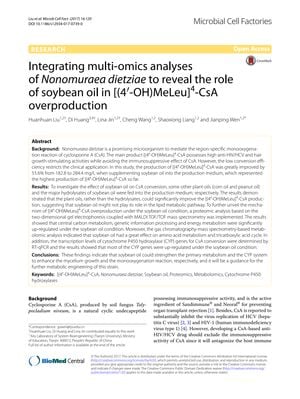Integrating Multi-Omics Analyses of Nonomuraea Dietziae to Reveal the Role of Soybean Oil in [(4′-OH)MeLeu]4-CsA Overproduction
July 2017
in “
Microbial Cell Factories
”

TLDR Adding soybean oil to Nonomuraea dietziae increases production of a beneficial compound by improving metabolism and enzyme systems.
In the 2017 study, Liu et al. discovered that adding soybean oil to the culture medium of Nonomuraea dietziae increased the production of [(4'-OH)MeLeu]4-CsA, a cyclosporine A derivative with anti-HIV/HCV and hair growth-stimulating properties, by 55.6%, achieving the highest recorded level of 284.4 mg/L. Multi-omics analyses, including proteomics and metabolomics, revealed that soybean oil upregulated central carbon metabolism, genetic information processing, and energy metabolism, rather than acting through the lipid metabolic pathway. The presence of soybean oil also affected amino acid metabolism and the tricarboxylic acid cycle, and upregulated cytochrome P450 hydroxylase genes involved in CSA conversion. The study concluded that soybean oil enhances the production of [(4'-OH)MeLeu]4-CsA by improving primary metabolism and the cytochrome P450 system, which could inform further strain metabolic engineering. Additionally, other plant oils like corn oil and peanut oil also had a similar effect, suggesting a common beneficial feature among these oils.





